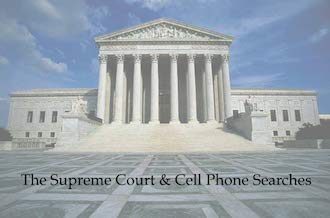Two unrelated cases will be before the U.S. Supreme Court on the issue of cellphone searches incident to an arrest. In one case the cellphone search was upheld, in the other it was ruled as unconstitutional. The issue is important when 91% of U.S. residents carry cellphones with them.
Searches are 4th Amendment issues. First, warrantless searches are disfavored which means a search without a warrant is acceptable only when it falls within either an “exigency” or “exceptions.” Start by accepting that the 4th Amendment protects people, not places. Expectations of privacy are our cultural heritage, for example: one’s home is your castle and you have a heightened and recognized expectation of greater privacy in your home than on the street. We argue in court all the time about whether someone living in a rooming house, in a car, in a shelter, in a hotel, in a friend’s house is in their home…you can think up a list and it is a long one… The approach courts take is a “totality of the circumstances” standard, which means if you can convince a judge that sleeping under a bridge is your home, then you have a heightened expectation of privacy and are not subject to a warrantless search…unless there are “exigent” circumstances or an “exception”. The first exception is officer safety. Courts have told us for fifty years that because cars move around a lot, or can move, that you have no expectation of privacy and cars are subject to searches. Courts add things like, what is the scope of a search? Is looking in the car’s locked trunk and finding a dead body a reasonable search or is it beyond the scope of the reasons for the search, such as officer safety. Now back to cellphones.

First, was the arrest made in your home or in the street or in a car? OK, both cases involve cars so we have no reasonable expectation of privacy in a car. Next…. was the search incident to an arrest? Was it part of taking an inventory? Once inventoried, can it be opened for officer safety or to preserve your property rights? Would it inevitably been opened? Was the search for officer safety? How can the State argue that looking in a cellphone directory has anything to do with officer safety at a traffic stop? Surely they cannot, but in one case they did and the search was upheld.
The thing to avoid is the old 20-20 hindsight practical approach because courts don’t and can’t do that because we are a nation of laws and the law creates a right to be free of unreasonable searches and seizures. If you did nothing wrong, then you have nothing to hide, right? Or…. you have no recognized constitutional rights to privacy when you commit a crime, so if the cop finds something like a dead body then it’s okay…Right? Or wrong? Or perhaps you start from thinking that if I didn’t do anything wrong then I should be okay with the police searching my cellphone, and my house, and my pockets, and my bank account, and my diary and my charge accounts and my cash purchases. If you have nothing to hide then the police should be able to search you…are you okay with that? Or would you be more comfortable with the reverse, if I have nothing to hide then I have no duty to let police search me.
Just to add something more to the soupy state of your mind at this point…. if a police officer finds a key in your pocket does that mean he can take the key and open your home’s front door and search?
Look for some good intellectual and possibly tortured twisting of the “totality of the circumstances” added to societal approved expectations of privacy, scope of searches and then stand back and watch our Supremes spin this one into some very important new rules for criminal defense lawyers.
For more information read these articles:
Supreme Court Considers Limits On Warrantless Cellphone Searches
 South Florida Criminal Defense Lawyer Blog
South Florida Criminal Defense Lawyer Blog



